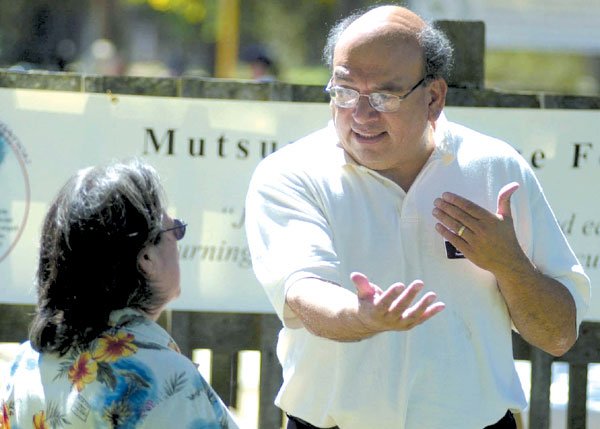Hollister
– A group of San Benito County residents calling themselves
Casinos Represent a Poor Solution (CRAPS) has formed to oppose an
Indian tribe’s proposed gaming resort off Highway 25.
The newly-formed group held a meeting Sunday attended by more
than 100 people, according to Annette Giacomazzi, former
spokesperson for the No on Measure G campaign. She’s heading the
effort to lobby against a casino’s construction. Measure G
successfully protected unincorporated land in San Benito
County.
Hollister – A group of San Benito County residents calling themselves Casinos Represent a Poor Solution (CRAPS) has formed to oppose an Indian tribe’s proposed gaming resort off Highway 25.
The newly-formed group held a meeting Sunday attended by more than 100 people, according to Annette Giacomazzi, former spokesperson for the No on Measure G campaign. She’s heading the effort to lobby against a casino’s construction. Measure G successfully protected unincorporated land in San Benito County.
The group is not a political action committee, so it cannot start a campaign fund and isn’t restricted by state elections laws, she said. For now, it is pursuing recognition as a nonprofit organization.
Among the primary concerns, the group opposes a casino because Indian tribes aren’t restricted by local laws. Giacomazzi also said it would increase the area’s crime rate.
But the “No. 1 reason” for opposition, she said, is the tribe’s sovereignty from government restrictions. Tribes recognized by the federal government aren’t regulated by local, state or federal laws, including taxes.
She thinks the tribe and its investors can make promises to gain local support – such as funding to Highway 25 expansion and cash offerings – only to renege on the offer later.
But the tribe’s attorney, Phillip Thompson, disagrees. He pointed out how Indian tribes can sign waivers to forgo sovereignty rights with certain laws.
“That’s just not true,” Thompson said after first hearing about the group Monday. “What it shows, it shows an inherent misunderstanding of Indian law. I would recommend that before making an announcement like that, they hire an attorney with relevant Indian experience.”
Although Giacomazzi led the successful campaign against the land use measure on the March ballot, this group’s membership will be much different, she said.
It’s unclear how many people, or who, will take part. Sunday’s gathering was intended for people to ask questions and learn about CRAPS – the first organized opposition to the casino proposal. She didn’t provide contact information for the group, but said residents should call their supervisors and express opinions on the proposal.
The five-member California Valley Miwok tribe is pursuing land near the border of San Benito and Santa Clara counties near Highway 25 to build a $100 million to $300 million casino and hotel resort. Investors say it would compare to Yolo County’s Cache Creek Casino, which has 1,762 slot machines and 120 table games.
Sheriff Curtis Hill also attended Sunday’s meeting and talked about potential impacts of a casino on law enforcement.
He has been adamant in his opposition to a casino because he believes it would increase crime and worsen traffic congestion. He’s compiling statistics on casino impacts to present to the Board of Supervisors in the near future.
“I owe it to this community to make sure they get the statistical information of the law enforcement impacts,” Hill said Monday.
Thompson also said the tribe and its investors are willing to “sit down and talk” with the CRAPS group.
“We’re not going to try to put anybody out of the process,” he said.














